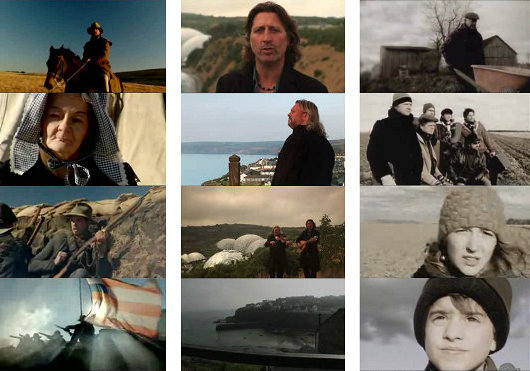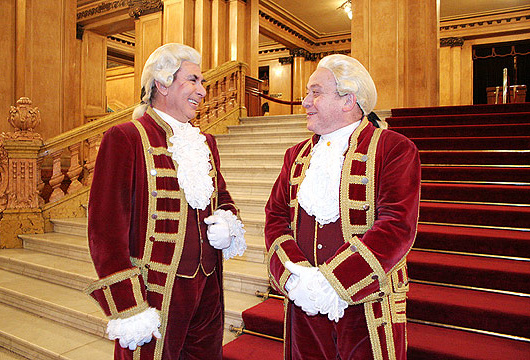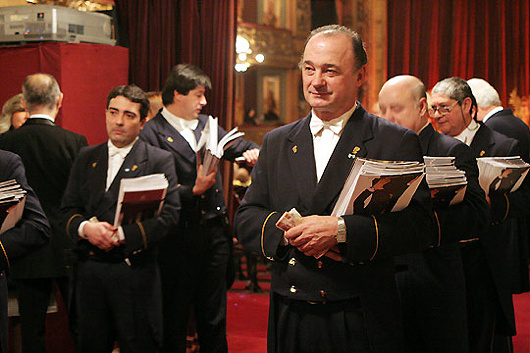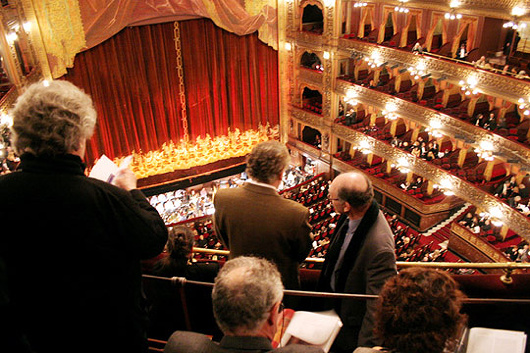Music
About Andrew Cusack
 Writer, web designer, etc.; born in New York; educated in Argentina, Scotland, and South Africa; now based in London.
Writer, web designer, etc.; born in New York; educated in Argentina, Scotland, and South Africa; now based in London. read more
News
Blogs
Reviews & Periodicals
Arts & Design
World
France
Mitteleuropa
Knickerbockers
Argentina
The Levant
Africa
Cape of Good Hope
Netherlands
Scandinavia
Québec
India
Muscovy
Germany
Academica
Die kleine dorpie Betlehem
JA JA JA, ons onthou: die Amerikaanse Episcopaalse biskop Phillips Brooks was nie ’n bolwerk van ortodoksie nie. Hy het die ryk van gevoel bo die waarheid verhef, maar nie noodwendig teen die waarheid nie — hulle het in die negentiende eeu nog ’n bietjie politesse gehad.
Soos R.R. Reno geskryf het: Brooks “het geen moeilike teologiese kwessies gedink of enige nuwe intellektuele grond gebreek nie.” In Nieu-Engeland was hy “heeltemal afgeleide en uiters invloedryk”.
Reg genoeg… en vandag leef ons in Brooks se nawêreld. Maar hy het ’n klein geskenk aan die wêreld gegee, en sy klein geskenkie was ’n lofsang — ’n Kersfees liedtjie.
Die wysie wat in Amerika gebruik word, is sakkarien. Maar die Britse een — “Forest Green” — is melodieus en goed. (’n Video hieronder, en Engels, gesing deur die koor van St George’s in Windsor-kasteel.)
lê rustig daardie nag,
terwyl dié wonderwerk gebeur
waarvoor die wêreld wag.
verskyn ’n nuwe dag
vir almal wat in nood verkeer
en op sy redding wag.
Toe God se Seun gebore is,
was daar geen plek vir Hom;
so word ’n donker dierestal
’n helder heiligdom.
verskyn ’n Koningster,
wat ewig lig en vrede straal
na mense wyd en ver.
O Koningskind daar in die krip,
U kom hier by ons woon.
Net U versoen ons sondeskuld
en maak ons lewe skoon.
want U kom ons herstel.
O Vredekoning, God met ons,
U is Immanuel.
Choral Concert in N.Y.
Manhattanites and denizens of the neighbouring boroughs and counties might be used to going to the Church of St Thomas on Fifth Avenue to hear the best choir in New York, but this evening the house of worship is hosting the Westminster Cathedral Choir, the best choir in London. If you haven’t made plans for the evening, there are still tickets available here.
Tonight’s concert will feature some Victoria, some Elgar, some Guerrero, and more, but most appealing to me is the Christus vincit by James MacMillan — Scotland’s greatest living composer. If you share my tastes, you avoid music by any composer who hasn’t been dead at least half a century, but MacMillan is good enough to be elevated to the realms of the honorary deceased. He’s also commented on this blog in the past!
Afrikaans Rachmaninoff Vespers a Surprise Hit
In an attempt to make great music more accessible to South African audiences, Rachmaninoff’s Vespers have been translated into Afrikaans and have proved a surprise hit. The translation of texts from the Russian Orthodox all-night vigil service was commissioned by the Vriende van Afrikaans society at the suggestion of Leon Starker, director of the Pro Cantu Youth Choir and the Cape Chamber Choir, and the translation was done by the Durbanville musicologist and polyglot Hélène Dippenaar.
The work, composed in 1915, was performed across the country during the past year, including at the Voortrekkermonument in Pretoria. A final concert at St. George’s Cathedral in Cape Town was added in response to the high demand from the music-loving public.
A compact disc of the Rachmaninoff Vespers in Afrikaans has also been released by Pro Cantu, which rehearses at Hoërskool D.F. Malan in Bellville and draws its members from across the Cape Peninsula.
A Miscellany of Mexican Music
Juan Gutiérrez de Padilla was born in Malaga, Spain in 1590 but moved to New Spain in 1620, and was appointed choirmaster of Puebla Cathedral in 1628. His corpus is massive, with over 700 works surviving. His Stabat Mater is above, but you should also hear his Missa ego flos campi. (more…)
Mimi Coertse: “Der Hölle Rache” van Die Zauberflöte
Van al die operahuise in Afrika, die helfte is in Suid-Afrika — dink jy, daar is net vier operahuise in die vasteland. Nietemin, opera het ’n ryk en vrugbaar tradisie in die land, en die koningin van Suid-Afrikaanse opera-sangers is die sopraan Mimi Coertse. Sy was in Durban gebore in 1932 en het haar stem-opleiding in Suid-Afrika voltooi. In 1953, Coertse het die uitsaaier en komponis Dawid Engela getroud. (Engela het sy “Huwelikskantate” vir hul troue saamgestel). In Januarie 1955, Coertse het haar opera debuut gemaak in ’n kleine rol in Parsifal by die Teatro San Carlo in Napels.
Dit was 17de Maart 1956 — St. Patrick’s Day — toe Coertse die rol van die Koningin van die nag gesing in “Die Zauberflöte” met die Weense Staatsopera in Oostenryk. Sy het met die Weense Staatsopera vir meer as twintig jare gebly. Gravin Christl Schönfeld onthou:
In sy lang voortgang, Mimi Coertse het baie eerbewyse opgestapel. In 1961, die Medalje van Eer van Die Suid-Afrikaanse Akademie vir Wetenskap en Kuns; in 1966, die prestige titel van “Kammersängerin” vanaf die regering van Oostenryk; in 1985, die Suid-Afrikaanse Dekorasie vir Voortreflike Diens; en in 1996, die “Oesterreichische Ehrenkreuz für Wissenschaft und Kunst” (Oostenrykse Erekruis vir Wetenskap en Kuns) — die hoogste kunsdekorasie van Oostenryk.
Waar is sy nou? Sedert 1998, Mimi Coertse bestuur die “Black Tie Ensemble” — ’n projek om die verandering tussen opleiding en professionele uitvoering te versag. ’n Halfeeu van diens in die kunste voortsit!
First Things, Three Songs

Through an interesting post by Joseph Bottum on the First Things blog, I discover that R. R. Reno posted all three of the songs I elaborated upon in my June 2007 post “We’ve Lost More Than We’ll Ever Know”, though (so far as I can tell) he arrived at the same three without stumbling across my entry on them. I always read First Things in New York (it’s one of my favourites, and simply a must-read), but it’s sadly not available in South Africa (bar actually scraping one’s pennies together for a subscription) so I’ll just have to wade through friends’ archives when I return to the Empire State. (Or does the Society Library have a subscription? And if not, why not?).
While it has a reputation among some Catholics as being a bit too liberal & democratist, I suspect the whiff of Americanism one finds in the pages of First Things is akin to the aroma of tobacco in an old bar: the smell lingers but that doesn’t mean anyone’s actually still smoking. Nonetheless, they often feature top-notch articles and writing that are of interest to Catholics & other traditionalists.
Church music by the unchurched: Saint-Saëns
“No thoughtful Catholic will have difficulty distinguishing Mozart’s music from his Freemasonry, any more, for example, than separating Bach’s work from his Lutheranism. If we were to dismiss every human work that had been created by a sinner there might not be much left standing. I was once taken to task for leading a congregation in a ‘Protestant tune’, to which I replied, ‘Which note was Protestant?’. Let us move on.”
So begins a delightful appreciation of the sacred music of Camille Saint-Saëns written by R. J. Stove and printed in the latest issue of Oriens, an Australian publication devoted to traditional Catholic culture. It is but the first of a series discussing eminent composers who spent most of their lives outside orthodox Catholicism, but who made notable contributions to sacred music. Mr. Stove is also a contributor to The New Criterion and was kind enough to send me a copy of his article, which was both comprehensive and concise while remaining interesting throughout. More information on Oriens can be found at their website.
The Teatro Colón in Buenos Aires
Finest opera house of the New World

Am I old-fashioned, or aren’t footmen not supposed to smile?

This usher knows precisely how much (which is to say, how little) emotion to show.

But now, everyone to their seats…
The magnificent Teatro Colón is currently closed for refurbishment until 25 May 2008, when the most prominent opera house under the Southern Cross will reopen brighter and better than ever.
‘We’ve Lost More Than We’ll Ever Know’
In Three Corners of the Commonwealth, Popular Musicians Demonstrate Rejection of Modernity

In South Africa, England, and Quebec, popular musicians have expressed regret over the rejection of their traditional cultures by the destructive onward march of modernity. The hugely popular song ‘De La Rey’, sung in Afrikaans by Bok van Blerk I have already explored in greater depth in an article for Norumbega, but ‘Roots’ by England’s Show of Hands and ‘Dégénération’ by Québécois group Mes Aïeux are worthy of notice.
‘Roots’, as one would expect from the title, decries the severing of the English people from their lyrical musical tradition and lifestyle, being replaced by “Indian, Asian, Afro-Celt”, while the song’s refrain evokes images of a people adrift: “Haul away boys let them go/ Out in the wind and the rain and snow/ We’ve lost more than we’ll ever know/ On the rocky shores of England”. In one verse, the song taps into a particular pet peeve of mine, the complete invasion of pubs by the dreaded television screen:
Is three folk singers in a pub near Wells
Well I’ve got a vision of urban sprawl
Pubs where no one ever sings at all
And everyone is staring at a TV screen
Overpaid soccer stars, prancing teens
Australian soap, American rap
Estuary English, Baseball cap
There is no greater killer of good conversation than the massive influx of television screens into the pubs. Just the other evening I was down in our regular in Bronxville and from my vantage point alone I could see three television screens. The bright technicolor projection of baseball, soccer, football, and rugby into an otherwise dark space is too great a distraction for the eye. Bad enough sitting in a booth, it is even worse having dinner at the bar when you do not at least have the advantage of sitting opposite your drinking companion. How much more of a good time it would be without those dazzling displays, and without the obnoxiously loud music, either piped in from the jukebox or else some third-rate band singing third-rate cover songs of third-rate rock groups. Bleccch! It is those moments when one yearns to be ensconced by the fire in the Russell on the Scores in St Andrews, either accompanied solely by a book and a solid pint, or engaged in the usual joviality with the after-Rosary crowd.
The Québécois song, meanwhile, laments the decline of the family from large in size and from tied to the earth to solitary and confined in the city. The name of the band — Mes Aïeux — means “My Ancestors” and ‘Dégénération’ is a play on words, meaning ‘degeneration’ but also soundling like ‘des generations’ — ‘of the generations’. The song opens:
Ton arrière-grand-père, il a labouré la terre
Et pi ton grand-père a rentabilisé la terre
pis ton père, il l’a vendu pour devenir fonctionnaire
Et pi toé mon p’tit gars, tu sais pu c’que tu vas faire
Dans ton p’tit trois et d’mi ben trop cher, frète en hiver
Il te vient des envies de dev’nir propriétaire
Et tu rêves la nuit d’avoir ton petit lopin d’terre
Your great-great grandfather cleared the earth
Your great-grandfather laboured on the earth
Your grandfather turned a profit from the earth
Then your father sold the earth to become a bureaucrat
Now you, my little man, you don’t know what to do
In your little 3 room apartment – too expensive and cold in the winter
You want something to call your own
And you dream at night of having your own little piece of earth.
The next verse goes on about the maternal line of the family: the great-great grandmother “had fourteen kids”, the next generation “had about as many”, the next “had three, that was enough for her” but “Your mom didn’t want any, you were an accident”.
Quand tu fais des conn’ries, tu t’en sauves en avortant
Mais y’a des matins, tu te réveilles en pleurant
Quand tu rêves la nuit d’une grande table entourées d’enfants
Now you, my little lady, change partners all the time
When you make a mistake you escape by aborting
But there are mornings you awake crying
When you dream in the night of a large table surrounded by little ones.
The song is one of the most popular downloads on iTunes Canada, and the band’s most recent album has gone double-platinum.
Music videos of ‘De La Rey’, ‘Roots’, and ‘Dégénération’ after the jump.
Sources Fides et Ardor: Sign of Hope – Mes Aïeux | Fides et Ardor: The People Speak (or sing…)
Previously: Breaking the Mold in Quebec | The Men Who Saved Quebec | Hitchcock in Quebec
Search
Instagram: @andcusack
Click here for my Instagram photos.Most Recent Posts
- Articles of Note: 27 January 2025 January 27, 2025
- Spooks’ Crown January 23, 2025
- Jesuit Gothic January 23, 2025
- Christ Church December 29, 2024
- A Christmas Gift from the Governor December 24, 2024
Most Recent Comments
Book Wishlist
Monthly Archives
Categories


